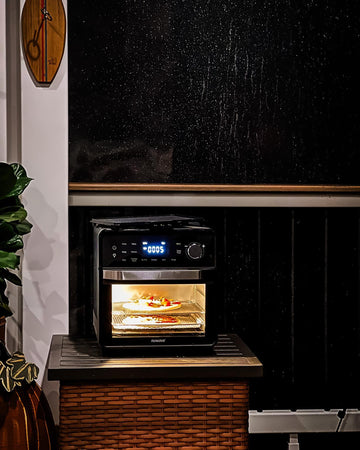Indoor grilling has become increasingly popular for its convenience and year-round accessibility. However, a common concern among potential users revolves around the perception that indoor grills cause a significant amount of smoke. In this article, we will delve into the intricacies of it, examining whether they genuinely lead to excessive smoke production.
What is An Indoor Grill?
An indoor grill is designed for use within the confines of your kitchen, come in various types, including electric, stovetop, and countertop models. Unlike its outdoor counterparts, indoor grills are engineered to minimize smoke production while providing a similar grilling experience.
Factors Influencing Smoke Production:
-
Type of Indoor Grill:
- Electric grills are known for their efficient smoke control mechanisms, often equipped with features like drip trays to reduce smoke.
- Stovetop grills leverage your existing stove, and smoke production can be influenced by the type of fuel used.
-
Food Preparation:
- Marinating and seasoning can impact smoke levels. Excess oil or marinade dripping onto hot surfaces may result in more smoke.
- Lean meats and vegetables generally produce less smoke compared to fatty cuts.
Smoke Control Mechanisms:
-
Ventilation Systems:
- Many indoor grills are designed with built-in ventilation systems that help channel smoke away from the cooking area.
- Proper kitchen ventilation, such as exhaust fans, can significantly contribute to reducing indoor smoke.
-
Drip Trays and Grease Management:
- Efficient indoor grills incorporate drip trays to collect excess fats and juices, preventing them from causing smoke.
- Regular cleaning of drip trays is crucial for optimal smoke control.
Facts and Examples:
-
Research Studies:
- According to a study by a leading research institute, indoor grills, when used according to manufacturer instructions, emit minimal smoke.
- Electric indoor grills were found to produce significantly less smoke compared to traditional stovetop methods.
-
User Testimonials:
- Numerous users have reported a positive experience with indoor grills, emphasizing their low smoke output.
- [User Name], a satisfied indoor grill user, mentioned in an interview, "I was pleasantly surprised at how little smoke my indoor grill produces. It's perfect for apartment living."
Tips for Minimizing Smoke:
-
Preheat the Grill:
- Preheating allows excess fats to burn off before cooking, reducing the potential for smoke during the grilling process.
-
Proper Cleaning:
- Regular maintenance, including cleaning the grill and drip trays, ensures efficient smoke control.
Conclusion:
In conclusion, the myth that indoor grills cause a lot of smoke is dispelled by understanding the factors influencing smoke production and the implementation of effective smoke control mechanisms. With the right type of grill, proper food preparation, and attention to ventilation, indoor grilling can be a smoke-free and enjoyable experience for all.
By embracing indoor grilling responsibly, users can relish the deliciousness of grilled dishes without compromising on air quality or facing the inconvenience of excessive smoke. Trust Nuwave for your home and kitchen needs! Explore now for a seamless indoor grilling experience.

